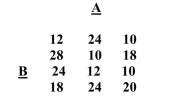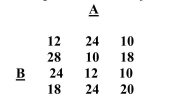Deck 12: Nonparametric Measures of Correlation
Question
Question
Question
Question
Question
Question
Question
Question
Question
Question
Question
Question
Question
Question
Question
Question
Question
Question
Question
Question
Question
Question
Question
Question
Question
Question
Question
Question
Question
Question
Question
Question
Question
Question
Question
Question
Question
Question
Question
Question
Question

Unlock Deck
Sign up to unlock the cards in this deck!
Unlock Deck
Unlock Deck
1/41
Play
Full screen (f)
Deck 12: Nonparametric Measures of Correlation
1
To test the significance of the rank-order correlation coefficient for large samples (N > 30), we use the following expression: 


2
To test the null hypothesis that X and Y are not associated in the population, we convert Our calculated G to a(n):
A)t score.
B)z score.
C)F ratio.
D)analysis of variance.
A)t score.
B)z score.
C)F ratio.
D)analysis of variance.
z score.
3
Which of the following is NOT a requirement for Spearman's rank-order correlation Coefficient?
A)Both X and Y variables must be ranked or ordered.
B)ordinal data
C)random sampling
D)All of the above are required.
A)Both X and Y variables must be ranked or ordered.
B)ordinal data
C)random sampling
D)All of the above are required.
All of the above are required.
4
When ordinal data measurement produces a large number of tied ranks, we should use:
A)Pearson's r.
B)Spearman's r.
C)Cramer's V.
D)Goodman's and Kruskal's gamma.
A)Pearson's r.
B)Spearman's r.
C)Cramer's V.
D)Goodman's and Kruskal's gamma.

Unlock Deck
Unlock for access to all 41 flashcards in this deck.
Unlock Deck
k this deck
5
A perfect positive correlations is expressed as +.5

Unlock Deck
Unlock for access to all 41 flashcards in this deck.
Unlock Deck
k this deck
6
If our obtained chi-square value for a 2 x 2 cross-tabulation is equal to 19.4 and we have 10 respondents in each cell, the phi coefficient is:
A).696
B).571
C)2.14
D)none of the above
A).696
B).571
C)2.14
D)none of the above

Unlock Deck
Unlock for access to all 41 flashcards in this deck.
Unlock Deck
k this deck
7
The contingency coefficient (C) will never exceed:
A).1
B).5
C)1
D)2
A).1
B).5
C)1
D)2

Unlock Deck
Unlock for access to all 41 flashcards in this deck.
Unlock Deck
k this deck
8
As a measure of association, the phi coefficient can only be used:
A)for nominal data.
B)for tables that are 2 x 2.
C)with samples that have been randomly drawn from a larger population.
D)all of the above
A)for nominal data.
B)for tables that are 2 x 2.
C)with samples that have been randomly drawn from a larger population.
D)all of the above

Unlock Deck
Unlock for access to all 41 flashcards in this deck.
Unlock Deck
k this deck
9
Goodman and Kruskal's gamma (G) is used for ordinal data.

Unlock Deck
Unlock for access to all 41 flashcards in this deck.
Unlock Deck
k this deck
10
Agreements and inversions can be understood as expressing the __________ of correlation Between X and Y variables.
A)correction
B)deviation
C)movement
D)di rection
A)correction
B)deviation
C)movement
D)di rection

Unlock Deck
Unlock for access to all 41 flashcards in this deck.
Unlock Deck
k this deck
11
Goodman's and Kruskal's gamma is best used when comparing:
A)variables at the nominal level with no tied ranks.
B)variables at the ordinal level with many tied ranks.
C)one nominal with one ordinal variable.
D)one ordinal and one interval variable with no tied ranks.
A)variables at the nominal level with no tied ranks.
B)variables at the ordinal level with many tied ranks.
C)one nominal with one ordinal variable.
D)one ordinal and one interval variable with no tied ranks.

Unlock Deck
Unlock for access to all 41 flashcards in this deck.
Unlock Deck
k this deck
12
Which of the following is taken into consideration when using Goodman and Kruskal's Gamma?
A)the number of agreements
B)the number of disagreements
C)the number of inversions
D)a and c
A)the number of agreements
B)the number of disagreements
C)the number of inversions
D)a and c

Unlock Deck
Unlock for access to all 41 flashcards in this deck.
Unlock Deck
k this deck
13
Which of the following is a requirement when computing Spearman's rank-order Correlation coefficient?
A)nominal level data
B)interval level data
C)ordinal level data
D)b and c
A)nominal level data
B)interval level data
C)ordinal level data
D)b and c

Unlock Deck
Unlock for access to all 41 flashcards in this deck.
Unlock Deck
k this deck
14
To determine the relationship between rank-ordered or ordinal data, we compute:
A)Pearson's r.
B)Spearman's rank-order correlation coefficient.
C)contingency coefficient.
D)Cram er's V.
A)Pearson's r.
B)Spearman's rank-order correlation coefficient.
C)contingency coefficient.
D)Cram er's V.

Unlock Deck
Unlock for access to all 41 flashcards in this deck.
Unlock Deck
k this deck
15
To calculate the phi coefficient we require:
A)the chi-square value.
B)total number of cases.
C)nominal data.
D)all of the above
A)the chi-square value.
B)total number of cases.
C)nominal data.
D)all of the above

Unlock Deck
Unlock for access to all 41 flashcards in this deck.
Unlock Deck
k this deck
16
What value below is missing from the following definition of Spearman's rank-order  correlation coefficient (r)
correlation coefficient (r)
A)
B)
C)
D)
 correlation coefficient (r)
correlation coefficient (r)A)

B)

C)

D)


Unlock Deck
Unlock for access to all 41 flashcards in this deck.
Unlock Deck
k this deck
17
When nominal data are presented in a 3 x 3 cross-tabulation, the correlation is computed Using:
A)Pearson's r.
B)Spearman's r.
C)the phi coefficient.
D)the contingency coefficient.
A)Pearson's r.
B)Spearman's r.
C)the phi coefficient.
D)the contingency coefficient.

Unlock Deck
Unlock for access to all 41 flashcards in this deck.
Unlock Deck
k this deck
18
Cramer's V is preferable to the contingency coefficient when:
A)the table is non-square (has an unequal number of rows and columns).
B)the table is 2 x 2.
C)the table has an equal number of rows and columns.
D )there is a large sample.
A)the table is non-square (has an unequal number of rows and columns).
B)the table is 2 x 2.
C)the table has an equal number of rows and columns.
D )there is a large sample.

Unlock Deck
Unlock for access to all 41 flashcards in this deck.
Unlock Deck
k this deck
19
Perfect inversion indicates a perfect negative correlation expressed as:
A)
B)
C)
D)
A)

B)

C)

D)


Unlock Deck
Unlock for access to all 41 flashcards in this deck.
Unlock Deck
k this deck
20
Which test is an alternative to the contingency coefficient?
A)The phi coefficient
B)Goodman's and Kruskal's gamma
C)Spearman's r
D)Cram er's V
A)The phi coefficient
B)Goodman's and Kruskal's gamma
C)Spearman's r
D)Cram er's V

Unlock Deck
Unlock for access to all 41 flashcards in this deck.
Unlock Deck
k this deck
21
The number of variables that rs seeks to find a correlation between is __________.

Unlock Deck
Unlock for access to all 41 flashcards in this deck.
Unlock Deck
k this deck
22
The phi coefficient (  s only used for a _____ row × _____ column size table.
s only used for a _____ row × _____ column size table.
 s only used for a _____ row × _____ column size table.
s only used for a _____ row × _____ column size table.
Unlock Deck
Unlock for access to all 41 flashcards in this deck.
Unlock Deck
k this deck
23
The question below refers to the following 3 x 4 contingency table:  Calculate the contingency coefficient.
Calculate the contingency coefficient.
 Calculate the contingency coefficient.
Calculate the contingency coefficient.
Unlock Deck
Unlock for access to all 41 flashcards in this deck.
Unlock Deck
k this deck
24
In Goodman's and Kruskal's gamma (G), perfect __________ indicates a perfect negative correlation.

Unlock Deck
Unlock for access to all 41 flashcards in this deck.
Unlock Deck
k this deck
25
Requirements for using gamma and phi include __________ sampling.

Unlock Deck
Unlock for access to all 41 flashcards in this deck.
Unlock Deck
k this deck
26
The question below refers to the following data depicting the relationship between political affiliation and age range: 
Calculate Goodman's and Kruskal's gamma.

Calculate Goodman's and Kruskal's gamma.

Unlock Deck
Unlock for access to all 41 flashcards in this deck.
Unlock Deck
k this deck
27
Compute G and a z-score to test for significance for the data below: 


Unlock Deck
Unlock for access to all 41 flashcards in this deck.
Unlock Deck
k this deck
28
The question below refers to the following data depicting the relationship between political affiliation and age range: 
Calculate the sum frequency of agreements.

Calculate the sum frequency of agreements.

Unlock Deck
Unlock for access to all 41 flashcards in this deck.
Unlock Deck
k this deck
29
Goodman's and Kruskal's gamma (G) is designed for large numbers of __________ ranks.

Unlock Deck
Unlock for access to all 41 flashcards in this deck.
Unlock Deck
k this deck
30
The contingency coefficient (C) is used for nominal tables larger than 2 x 2.

Unlock Deck
Unlock for access to all 41 flashcards in this deck.
Unlock Deck
k this deck
31
The question below refers to the following data depicting the relationship between political affiliation and age range: 
Calculate the sum frequency of inversions.

Calculate the sum frequency of inversions.

Unlock Deck
Unlock for access to all 41 flashcards in this deck.
Unlock Deck
k this deck
32
The phi coefficient (  is only used for __________ level data.
is only used for __________ level data.
 is only used for __________ level data.
is only used for __________ level data.
Unlock Deck
Unlock for access to all 41 flashcards in this deck.
Unlock Deck
k this deck
33
For rs to determine the exact position in the case of ties, one must add the tied ranks and __________ by the number of ties.

Unlock Deck
Unlock for access to all 41 flashcards in this deck.
Unlock Deck
k this deck
34
Calculate G using the following data: 


Unlock Deck
Unlock for access to all 41 flashcards in this deck.
Unlock Deck
k this deck
35
The question below refers to the following observations between work group size and satisfaction with work: 
Using the gamma test of significance, calculate the z-score. Can we reject the null hypothesis?

Using the gamma test of significance, calculate the z-score. Can we reject the null hypothesis?

Unlock Deck
Unlock for access to all 41 flashcards in this deck.
Unlock Deck
k this deck
36
The question below refers to the following observations between work group size and satisfaction with work: 
Test the association between work group size and satisfaction.

Test the association between work group size and satisfaction.

Unlock Deck
Unlock for access to all 41 flashcards in this deck.
Unlock Deck
k this deck
37
In Goodman's and Kruskal's gamma (G), perfect agreement indicates a perfect __________ correlation.

Unlock Deck
Unlock for access to all 41 flashcards in this deck.
Unlock Deck
k this deck
38
The contingency coefficient (C) and Cramer's V both use the calculated __________ value.

Unlock Deck
Unlock for access to all 41 flashcards in this deck.
Unlock Deck
k this deck
39
Spearman's rank-order correlation is only used for __________ level data.

Unlock Deck
Unlock for access to all 41 flashcards in this deck.
Unlock Deck
k this deck
40
The contingency coefficient is NOT based on chi-square.

Unlock Deck
Unlock for access to all 41 flashcards in this deck.
Unlock Deck
k this deck
41
Work Problems
The question below refers to the following 3 x 4 contingency table:
Calculate Cramer's V.
The question below refers to the following 3 x 4 contingency table:

Calculate Cramer's V.

Unlock Deck
Unlock for access to all 41 flashcards in this deck.
Unlock Deck
k this deck



